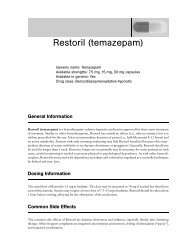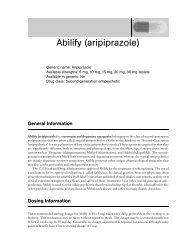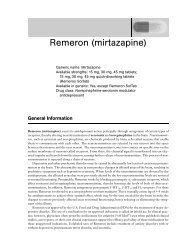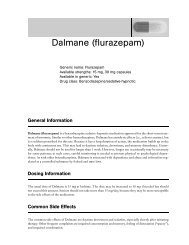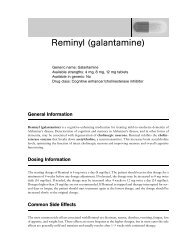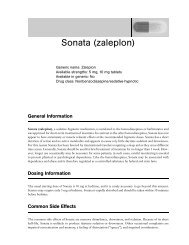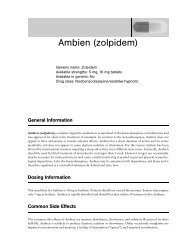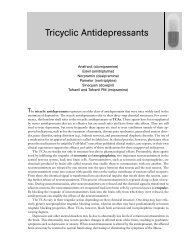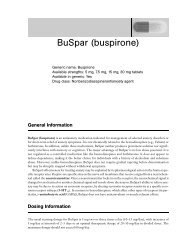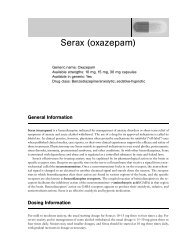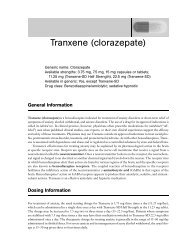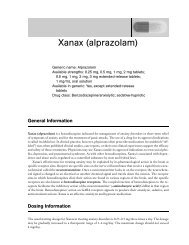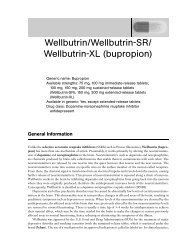Concerta (methylphenidate, controlled release)
Concerta (methylphenidate, controlled release)
Concerta (methylphenidate, controlled release)
You also want an ePaper? Increase the reach of your titles
YUMPU automatically turns print PDFs into web optimized ePapers that Google loves.
Page 2 of 4STIMULANTS<strong>Concerta</strong> tablets should be swallowed whole and never chewed or crushed. Chewing or crushing the tabletsdestroys the <strong>controlled</strong>-<strong>release</strong> system. <strong>Concerta</strong> should be taken early in the morning with or withoutfood. If taken late in the day, the stimulant effect can be prolonged into the night and interfere with sleep.Dosing InformationFor adults, the usual starting dosage for immediate-<strong>release</strong> <strong>methylphenidate</strong> is 5 mg twice a day, and the dosageis adjusted based on the individual’s response. The average dosage is 20–30 mg/day, administered two orthree times daily. The maximum dosage should not exceed 60 mg/day. <strong>Concerta</strong> may be used in place of regular<strong>methylphenidate</strong>, Ritalin-SR, or Metadate-ER by replacing the total daily dosage with the nearest equivalentdose of <strong>Concerta</strong>. For example, 5 mg of <strong>methylphenidate</strong> twice daily (10 mg/day) or three times a day(15 mg/day) could be replaced with 18 mg of <strong>Concerta</strong> once a day. In addition, 20 mg/day of Ritalin-SR orMetadate-ER could also be converted to 18 mg of <strong>Concerta</strong> once a day.Individuals new to <strong>methylphenidate</strong> may initially take 18 mg of <strong>Concerta</strong> once a day in the morning. Thedosage may be adjusted at weekly intervals to the next higher strength, depending on response, up to a maximumdosage of 54 mg/day.Common Side EffectsThe common side effects associated with taking <strong>Concerta</strong> are rapid heart rate, palpitations, nervousness, restlessness,insomnia, dry mouth, constipation, nausea, diarrhea, loss of appetite, weight loss, and elevation ofblood pressure.Adverse Reactions and Precautions<strong>Concerta</strong> has a high potential for abuse. Individuals with a history of alcohol and substance abuse may be atrisk for abusing stimulants. Individuals who abuse <strong>Concerta</strong> develop tolerance and psychological dependencethat may result in addiction. With long-term abuse of <strong>Concerta</strong> and the resulting sleepless nights, the individualmay develop psychotic symptoms.<strong>Concerta</strong> may increase blood pressure. Individuals with a history of high blood pressure or heart diseaseshould be cautious about taking <strong>Concerta</strong> because it can exacerbate these conditions. Un<strong>controlled</strong> highblood pressure can have serious consequences, including stroke and heart attacks. Patients taking <strong>Concerta</strong>should routinely check their blood pressure.Individuals with a history of seizure disorder should be cautious while taking <strong>Concerta</strong>, because it canlower the seizure threshold.In children and adolescents who are still in their growth period, <strong>Concerta</strong> can suppress linear growth. Physicianscommonly interrupt treatment, if possible, on weekends and holidays, when children are not in school,for growth catch-up. Children and adolescents taking <strong>Concerta</strong> require close monitoring for growth suppressionand periodic measuring of their height. This effect is not a concern in the adult population.<strong>Concerta</strong> may make tics worse in individuals with a tic disorder (i.e., twitching of a muscle group, especiallyin the face).<strong>Concerta</strong> should be avoided, or used with caution, by patients with a diagnosis of schizophrenia or bipolardisorder. Stimulants are frequently abused in this population, and high doses of <strong>Concerta</strong> may trigger psychosisand mania.
<strong>Concerta</strong> (<strong>methylphenidate</strong>, <strong>controlled</strong> <strong>release</strong>)Page 3 of 4Possible Drug Interactions<strong>Concerta</strong> should not be taken in combination with a group of antidepressants known as monoamine oxidaseinhibitors. The combination may precipitate increases in blood pressure. This and other significant druginteractions reported with <strong>Concerta</strong> are summarized in the table below.Ismelin (guanethidine)Monoamine oxidase inhibitors (MAOIs)Selective serotonin reuptake inhibitors (SSRIs)Weight-loss medicationsThe antihypertensive effects of Ismelin (i.e., loweringof blood pressure) may be decreased whencombined with <strong>Concerta</strong>.MAOI antidepressants (e.g., Parnate) should notbe taken with <strong>Concerta</strong>; the combinationmay precipitate dangerous elevation of bloodpressure.<strong>Concerta</strong> and other stimulants may elevate theblood levels of SSRI antidepressants (e.g., Paxil,Prozac) and enhance their effects.Weight-loss medications, prescription andnon-prescription, should not be taken withstimulants. Excess stimulation may causeagitation, irritability, insomnia, and otheradverse reactions.Use in Pregnancy and Breastfeeding: Pregnancy Category C<strong>Concerta</strong> has not been tested in women to determine its safety in pregnancy. The effects of the medicationon the developing fetus in pregnant women are unknown. Women who are pregnant or may become pregnantshould discuss this with their physician.Nursing mothers should not take any stimulant, because small amounts will pass into breast milk and beingested by the baby. If stopping the stimulant is not an alternative, breastfeeding should not be started orshould be discontinued.OverdoseThe severity of acute <strong>Concerta</strong> overdose depends on the amount ingested. The individual may experience aprogression of the following symptoms from an acute overdose: restlessness, agitation, irritability, insomnia,hyperactivity, confusion, elevated blood pressure, rapid heart rate, delirium, hallucinations, irregular heartbeat, convulsions, coma, circulatory collapse, and death.Any suspected overdose should be treated as an emergency. The person should be taken to the emergencydepartment for observation and treatment. The prescription bottle of medication (and any other medicationsuspected in the overdose) should be brought as well, because the information on the prescription label canbe helpful to the treating physician in determining the number of pills ingested.
Page 4 of 4STIMULANTSSpecial Considerations• To avoid insomnia, the daily dose of <strong>Concerta</strong> should be taken early in the morning and not late in the day.• <strong>Concerta</strong> may be taken with food to avoid stomach upset.• Do not take more than instructed by your physician.• If <strong>Concerta</strong> causes pronounced nervousness, restlessness, insomnia, loss of appetite, or weight loss, notifyyour physician.• If you miss a dose of <strong>Concerta</strong>, take it as soon as possible. If it is late in the afternoon or evening, skip thedose and continue your regular dosing schedule the next morning, but do not take double doses.• Do not chew or crush the tablets of <strong>Concerta</strong>; swallow them whole. Take with a full glass of water to helpswallow the medication.• Do not be alarmed by the empty tablet shell in your stool.• Store the medication in its originally labeled, light-resistant container, away from heat and moisture. Heatand moisture may precipitate breakdown of the medication.• Keep your medication out of reach of children.If you have any questions about your medication, consult your physician or pharmacist.Notes



